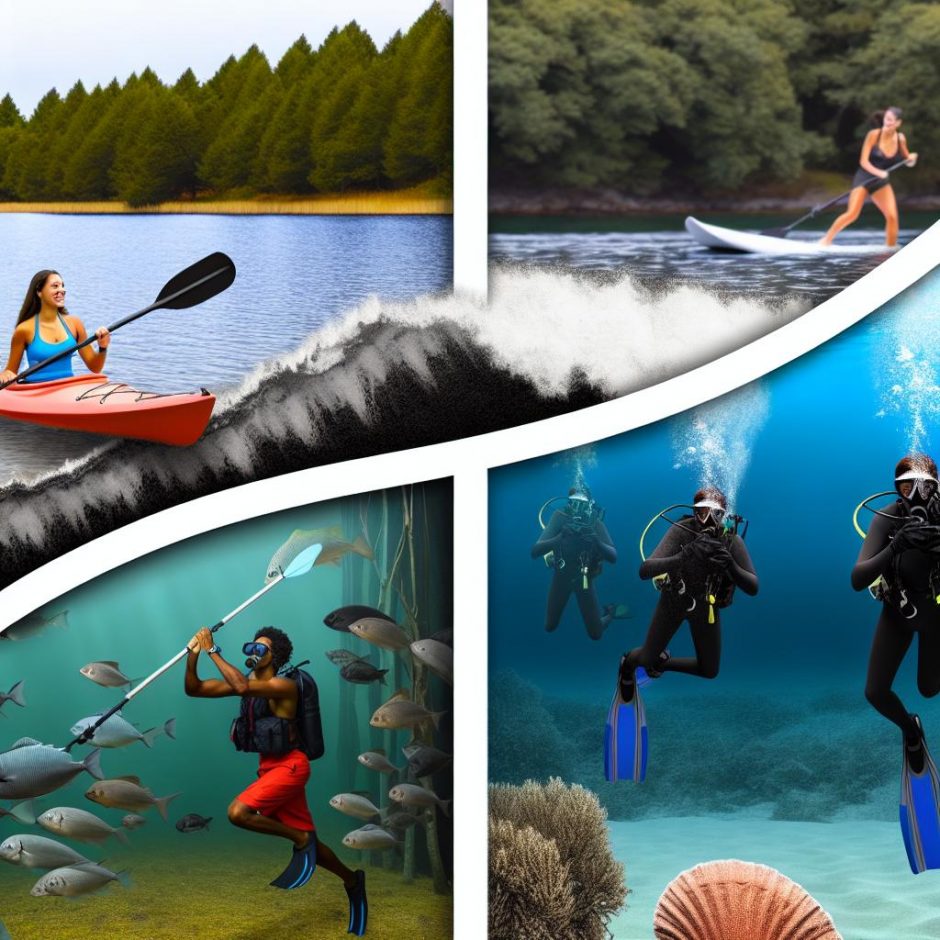Introduction
Freshwater and saltwater sports each offer unique experiences and require different skills, knowledge, and equipment. Understanding these differences can enhance your appreciation and enjoyment of these aquatic activities. As you delve into various sports, recognizing the distinctions between environments, equipment needs, and techniques is essential for making informed choices and maximizing your recreational pursuits.
Locations
Freshwater sports typically take place in geographic areas such as rivers, lakes, and ponds. These settings often provide a more controlled environment with generally calmer waters, which can be especially ideal for beginners. The serenity and predictability offered by freshwater locations make them attractive to those who are just starting their aquatic adventure or prefer a more tranquil experience.
In contrast, saltwater sports occur in the expansive realms of oceans and seas, presenting a vastly different context. The open waters of these environments bring unique challenges, including the influences of tides, strong currents, and the presence of larger waves. These conditions demand a higher level of skill and experience, as participants must navigate and respond to more dynamic water conditions. As such, saltwater environments cater to those seeking adventure and thrill, requiring a greater respect for the forces of nature at play.
Types of Sports
Freshwater sports encompass a range of activities such as fishing, kayaking, canoeing, and rowing. These sports often focus on elements like calm water navigation, endurance, and technique. Practitioners typically tailor their styles to the stillness and predictability of freshwater environments, refining their skills with emphasis on precision and control.
Conversely, saltwater sports include surfing, scuba diving, deep-sea fishing, and sailing. These activities generally require a proficiency in handling more dynamic and challenging water conditions. For example, surfing involves riding the ocean waves, necessitating a deep understanding of ocean patterns and wave behavior. Scuba diving demands familiarity with underwater ecosystems, and preparation for potential movements in currents, while deep-sea fishing takes advantage of the bounty of the ocean’s larger fish species, requiring robust equipment and strategic planning.
Equipment
The equipment used in freshwater sports often differs significantly from that necessary for saltwater sports. For instance, fishing in freshwater generally utilizes lighter rods and tackle. This is in part due to the smaller size and different types of fish commonly found in lakes and rivers, as opposed to the larger species encountered in the ocean, which require heavier gear suitable for saltwater conditions.
Similarly, clothing and gear used for saltwater activities like sailing or surfing demand a more robust build to withstand harsh environmental elements such as salt, wind, and intense sun exposure. Specialized materials and designs offer both protection and durability, ensuring that exposure to the elements does not degrade the performance or safety of these sports.
Environmental Factors
Making an informed choice between freshwater and saltwater sports often revolves around understanding the environmental conditions associated with each. Freshwater areas tend to exhibit more consistent climates, offering predictability in weather and water conditions. This can contribute positively to the overall experience by allowing sports enthusiasts to plan with greater certainty.
In contrast, saltwater locations may present more variability, with significant changes in weather patterns and sea states due to the influence of global weather systems. Knowledge of these environmental factors is crucial for ensuring safety and enriching the sporting experience. Participants must frequently adapt to unpredictable changes, honing their ability to read weather signals and anticipate potential shifts in sea and atmospheric conditions.
Wildlife Interaction
Wildlife interactions vary considerably between freshwater and saltwater environments. Freshwater sports often involve encounters with a diverse range of fish, birds, and insects. Observing and interacting with these creatures can enrich the experience, providing opportunities for education and conservation awareness.
On the other hand, saltwater sports offer the chance to encounter marine life including dolphins, sharks, and a wide array of fish and coral species. Saltwater environments often host species that require careful awareness and respect for maintaining both safety and the integrity of these ecosystems. Participants in saltwater sports are encouraged to observe and appreciate the wide diversity of life found beneath the sea, fostering a deeper connection to nature and a commitment to its preservation.
Adapting to Distinct Environments
The need to adapt to varying environments is a critical aspect of choosing between freshwater and saltwater activities. Freshwater settings typically require a focus on technical skills influenced by subtle environmental factors. In contrast, the unpredictability and dynamic nature of saltwater conditions demand heightened awareness and adaptability, transforming the challenges faced in these sports into opportunities for personal growth and skill enhancement.
Conservation and Sustainability
Regardless of whether you prefer freshwater or saltwater environments, commitment to conservation and sustainability remains paramount. Engaging responsibly with these natural resources involves not only enjoyment, but also stewardship, ensuring these environments remain vibrant and accessible for future generations. Education and awareness about individual impacts, and how these contribute to larger ecosystem health, are integral aspects of both freshwater and saltwater sports.
Conclusion
Both freshwater and saltwater sports provide rewarding opportunities for adventure and recreation. Your choice of focus might depend on various factors, such as geographical location, personal interest, and level of expertise. Whether you find fulfillment in the stillness of a freshwater lake or the roaring excitement of ocean waves, both types of sports offer enriching experiences that deepen one’s connection to nature. For more detailed information on specific sports, and to understand the different requirements they entail, exploring dedicated resources and expert guides online is recommended. Embrace the diversity of water-based activities and the distinct joys they bring, whether rowing on a peaceful river or sailing through ocean currents.

